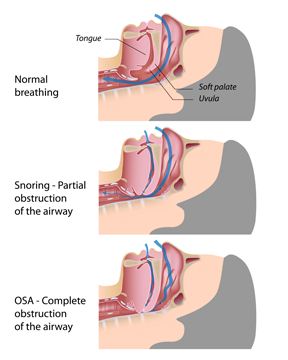Do you have a sleep disorder?
You may if the following symptoms exist:
• Difficulty in falling or staying asleep at night
• Snoring, snorting, and holding your breath while sleeping
• Loss of bed partner due to sleeping behavior
• Falling asleep while driving or when attending a meeting at work
• Legs jerking while sleeping feeling restless at night
• High blood pressure or heart problems
• Excessive sleepiness during the day, loss of energy, or morning headaches
Sleep Disorders in Children exhibit unique symptoms from adults, such as hyperactivety, decreased physical and mental growth, nightmares, sleep terrors, sleep walking and talking, bed-wetting, in addition to the classic symptoms.
common sleep disorders
Snoring - Snoring is the act of breathing through the open mouth in such a way as to cause a vibration of the uvula and soft palate, thus giving rise to a sound which may vary from a soft noise to a loud unpleasant sound. This most commonly occurs during sleep. The cause of snoring is having a blockage in the airway passage. When the airflow in the breathing passage becomes irregular due to the blockage, the soft palate will start vibrating. This vibrating of the soft palate is what causes the snoring sound.
Snoring is a problem if:
• You stop breathing during sleep and have to wake up to catch your breath,
• You are disturbing your sleep partner, or
• You are losing sleep because of your snoring.
In addition to problems stemming from sleep deprivation, snoring can cause more serious health problems. Snoring has been linked to increased risk of stroke; diabetes; high blood pressure; and heart disease. Snoring can also be a symptom of sleep apnea.
blood pressure; and heart disease. Snoring can also be a symptom of sleep apnea.
Sleep Apnea - The most severe and widespread sleep-related breathing disorder. Symptoms include difficulty of breathing or stoppage of breath during sleep, trouble staying awake during the day, headaches and snoring. Potentially life threatening, believed to be an independent risk factor for high blood pressure, cardiovascular disease, and stroke.
Narcolepsy - Patients complain of being so tired they fall asleep even after a full night's sleep. Other symptoms include cataplexy, a sudden loss of muscle function, sleep paralysis and frightening hallucinations.
Parasomnias - Abnormal physical behaviors that occur while sleeping that include sleepwalking, night-terrors, REM behavior disorder (violence while dreaming), rhythmic movement disorder (banging of head or rocking of body while sleeping), bed-wetting and teeth-grinding.
Other Disorders - Snoring, hypersomnia, restless legs syndrome, periodic limb movements in sleep, delayed sleep phase syndrome and advanced sleep phase syndrome.
Insomnia - The most common sleep complaint. Poor sleep attributed to difficulty falling asleep and waking up prematurely.
Did You Know?
- Sleep Apnea is recognized as a serious health problem that impacts about 20% of US adults, however more than 80% remain untreated. - Epidemiology of Obstructive Sleep Apnea. A population health perspective 2002
- Obstructive Sleep Apnea (OSA) is
a common, yet often undiagnosed sleep disorder. It afflicts 20 million adult men and women in America. People who have OSA stop breathing repeatedly during sleep because their airway collapses. - "Untreated sleep apena can cause high blood pressure and other cardiovascular disease, memory problems, weight gain, impotency, and headaches." - American Sleep Apnea Association
- Numerical statistics on snoring are often contradictory, but at least 30% of the adult population and perhaps as many as 50% of people in some demographics snore.
According to Dr. William C Dement, of the Stanford Sleep Center, anyone who snores and has daytime drowsiness should be evaluated for sleep disorders. - Insufficient Sleep is a Public Health Epidemic
“Sleep Insufficiency linked to motor vehicle crashes, industrial disasters, and medical and other occupational errors.”
-Institute of Medicine. - Sleep Disorders and Sleep Deprivation: An Unmet Public Health Problem. - Washington, DC: The National Academies Press; 2006.
- Over 18 million Americans suffer from Sleep Apnea. - American Sleep Apnea Association
- 1 in 3 Americans have undiagnosed sleep disorders.



